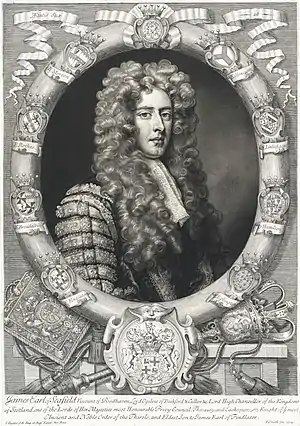James Ogilvy, 4th Earl of Findlater
James Ogilvy, 4th Earl of Findlater and 1st Earl of Seafield, KT, PC (11 July 1664 – 19 August 1730) was a Scottish politician.

The Earl of Findlater | |
|---|---|
Seumas Mac'IlleBhuidh | |
 James Ogilvy, 4th Earl of Findlater. | |
| Keeper of the Great Seal of Scotland | |
| In office 1713–1714 | |
| Monarch | Queen Anne |
| Preceded by | The Marquess of Tweeddale |
| Succeeded by | The Earl of Seafield |
| Lord Chancellor of Scotland | |
| In office 1705–1708 | |
| Monarch | Anne |
| Preceded by | The Earl of Marchmont |
| Succeeded by | David Steel (as Presiding Officer of the Scottish Parliament) |
| Personal details | |
| Born | 11 July 1664 |
| Died | 19 August 1730 (aged 66) |
Life
Findlater was the 2nd son of James Ogilvy, 3rd Earl of Findlater and Lady Anne Montgomerie.
He was elected to the Faculty of Advocates in 1685, and was a Commissioner to the Parliament of Scotland for Cullen, Banffshire from 1681 to 1682 and from 1689 to 1695. Although in the Convention Parliament of 1689 he had spoken for James II, he took the oath of allegiance to William and Mary, and after filling some minor official positions he was appointed to senior roles.[1] Findlater was Solicitor General for Scotland from 1693, Lord Chancellor of Scotland from 1702 to 1704 and from 1705 to 1708, Secretary of State from 1696 to 1702 and joint secretary from 1704 to 1705. He was elected a Fellow of the Royal Society in 1698.[2]
Findlater was created Viscount Seafield in 1698 and Earl of Seafield in 1701. He was a Commissioner for the Union from 1702 and an active promoter of the Union from 1706. He served as first Lord Chief Baron of the Scottish Court of Exchequer, established by the Act of Union. By 1713 his views on Union had changed and he moved for its repeal.
He sat in the British House of Lords as a Scottish Representative Peer from 1707 to 1710, from 1712 to 1715 and from 1722 to 1730. Findlater was admitted to the Privy Council of Great Britain in 1707 and was appointed Lord Chief Baron in the Court of Exchequer in 1707. In 1711 he succeeded his father as fourth Earl of Findlater.[1] He served as Keeper of the Great Seal of Scotland from 1713 to 1714.
Lord Findlater married Anne Dunbar, daughter of Sir William Dunbar, 1st Baronet, in 1687. He died in August 1730, aged 66, and was succeeded by his son James Ogilvy.
References
- Chisholm, Hugh, ed. (1911). . Encyclopædia Britannica. 24 (11th ed.). Cambridge University Press. p. 533.
- "Fellows details". Royal Society. Retrieved 18 June 2019.
External links
- Article with biographical notes
- Lee, Sidney, ed. (1895). . Dictionary of National Biography. 42. London: Smith, Elder & Co.
| Political offices | ||
|---|---|---|
| Preceded by The Earl of Marchmont |
Lord Chancellor of Scotland 1702–1704 |
Succeeded by The Marquess of Tweeddale |
| Preceded by The Marquess of Tweeddale |
Lord Chancellor of Scotland 1705–1708 |
In abeyance |
| Preceded by Hugh Campbell |
Keeper of the Great Seal of Scotland 1713–1714 |
Succeeded by William Johnstone |
| Peerage of Scotland | ||
| New creation | Earl of Seafield 1701–1730 |
Succeeded by James Ogilvy |
| Preceded by James Ogilvy |
Earl of Findlater 1711–1730 | |
| New creation | Viscount of Seafield 1698–1730 | |